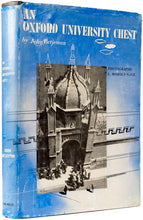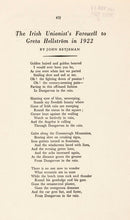Inscribed to the "Golden haired Swedish beauty" of The Irish Unionist's Farewell to Greta Hellström in 1922?
BETJEMAN, John. An Oxford University Chest. John Miles, 1938.
4to. Original blue cloth back paper-covered boards; with photographs by Moholy-Nagy; with supplied scarce dustwrapper which is a little chipped and creased with a few closed tears.
First edition, author's presentation copy inscribed on the front free endpaper to Greta Wyndham, the wife of his friend, the artist Richard Wyndham: "Beautiful Nörge / Grëta Wyndham / John Betjemanström 1938 / Some of the major misprints have been corrected." Betjeman has made the following holograph corrections: "John" to "James Gibbs" in the caption on p.18; "Trinity College Chapel" for "Christchurch Cathedral" on p.118 and "Christine" for "Christian Longford" on p.186.
Richard Wyndham and Betjeman moved in the same social circles notably both appearing in the amateur film The Sailor's Return filmed at Cecil Beaton's home Ashcombe. The news of this film, with Lady Caroline Paget starring as Tulip, also provided Betjeman with one of his few front-page scoops as a journalist on the Standard. Wyndham also provided artwork for Shell when Betjeman was working there under Jack Beddington.
Caroline Dakers in Clouds: The Biography of a Country House comments "From 1929 onwards a regular visitor to Tickerage was Greta Wulfsberg, a Norwegian of 'piquant charm', one of Dick's [Richard Wyndham's] models. When she became pregnant in 1930, Dick agreed to marry her; his second daughter Ingrid was born the following year...He gave Ingrid a lavish christening party at Clouds but otherwise spent little time with his baby daughter. She lived for much of her childhood with her grandfather Guy and Violet Wyndham at Parliament Piece. Meanwhile Dick and Greta agreed to remain on friendly terms, often visiting country houses together, hosting parties in London, but only occasionally cohabiting as husband and wife. With the freedom to pursue their own interests, they remained on affectionate terms."
Betjeman's warm inscription to Wyndham's wife Greta may provide the solution to one of the unanswered Betjemanian literary puzzles, the identity of the "golden haired Swedish beauty" in the poem The Irish Unionist's Farewell to Greta Hellström in 1922. In his biography Bevis Hillier spends some time considering the case (New Fame, New Love pp.328- 333), finally proposing Emily Villiers-Stuart as the unidentified lover of the poem, but concluding "Like the "Mr WH" conundrum, the matter is likely to remain a tantalizing mystery - unless, some day, a cache of hitherto unknown love-letters should come to light, with indisputable revelations."
Although not a "cache of love-letters", the inscription in this book however would seem to cast Greta Wyndham in the role. Betjeman has changed her nationality from Norwegian to Swedish, possibly to disguise her identity, or for ease of scansion, or even perhaps to create a resonance with the best-known Greta in the 1930s - the Swedish Greta Garbo, who would have been specially well-known to JB as film critic of the Evening Standard in 1934-35. From a photograph of her taken with Dick at Tickerage it would also seem that Greta was in fact a brunette rather than 'golden haired', but certainly a beauty.
The Irish Unionist's Farewell to Greta Hellström in 1922 was first published in the December 1945 issue of the Cornhill Magazine and then collected in New Bats in Old Belfries. By this stage Greta had divorced Richard Wyndham and Betjeman may have felt therefore more confident in alluding to an earlier amorous tryst.
With loosely inserted a first proof (ink stamp dated 16 Nov 1945) of pp.479/480 from the December 1945 Cornhill Magazine printing the poem for the first time. It would seem highly improbable that Betjeman would send Greta Wyndham the proof if she were not the woman apostrophized in his poem.
#2084130





